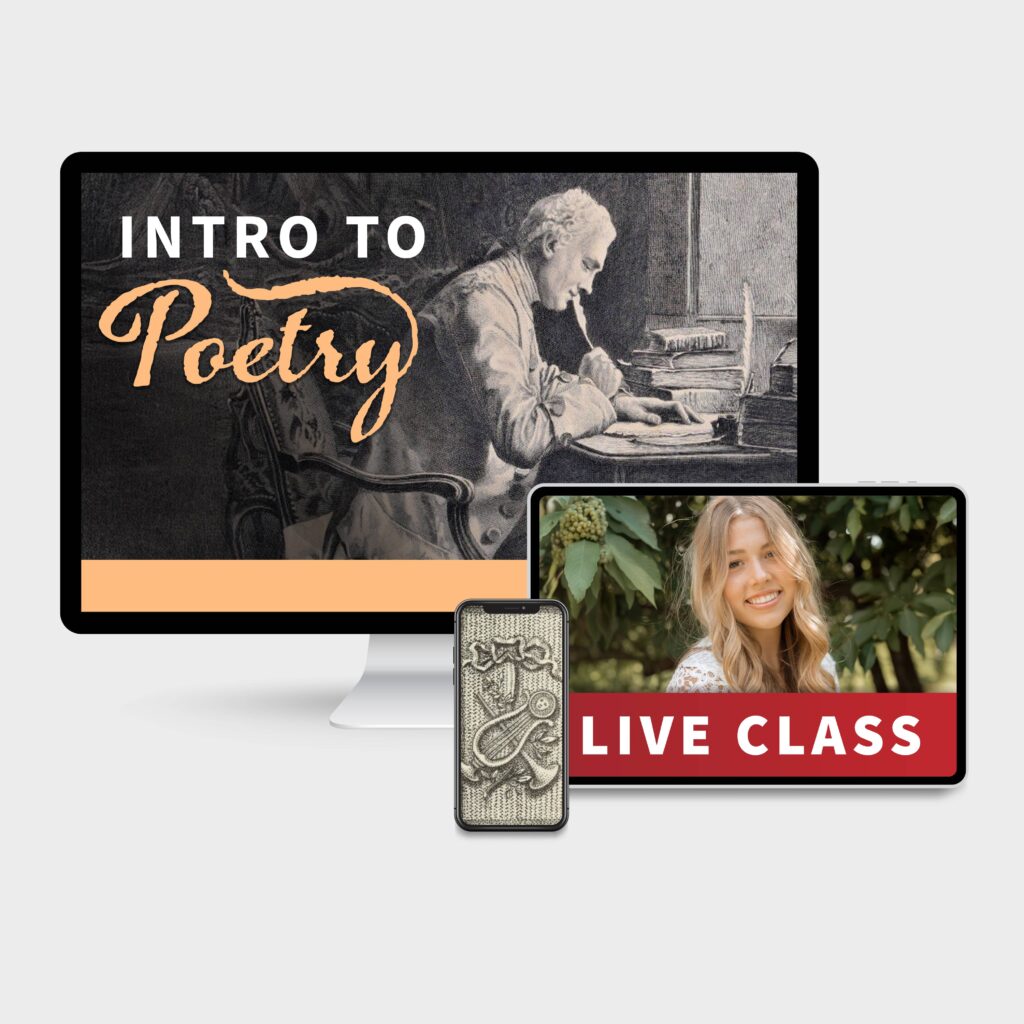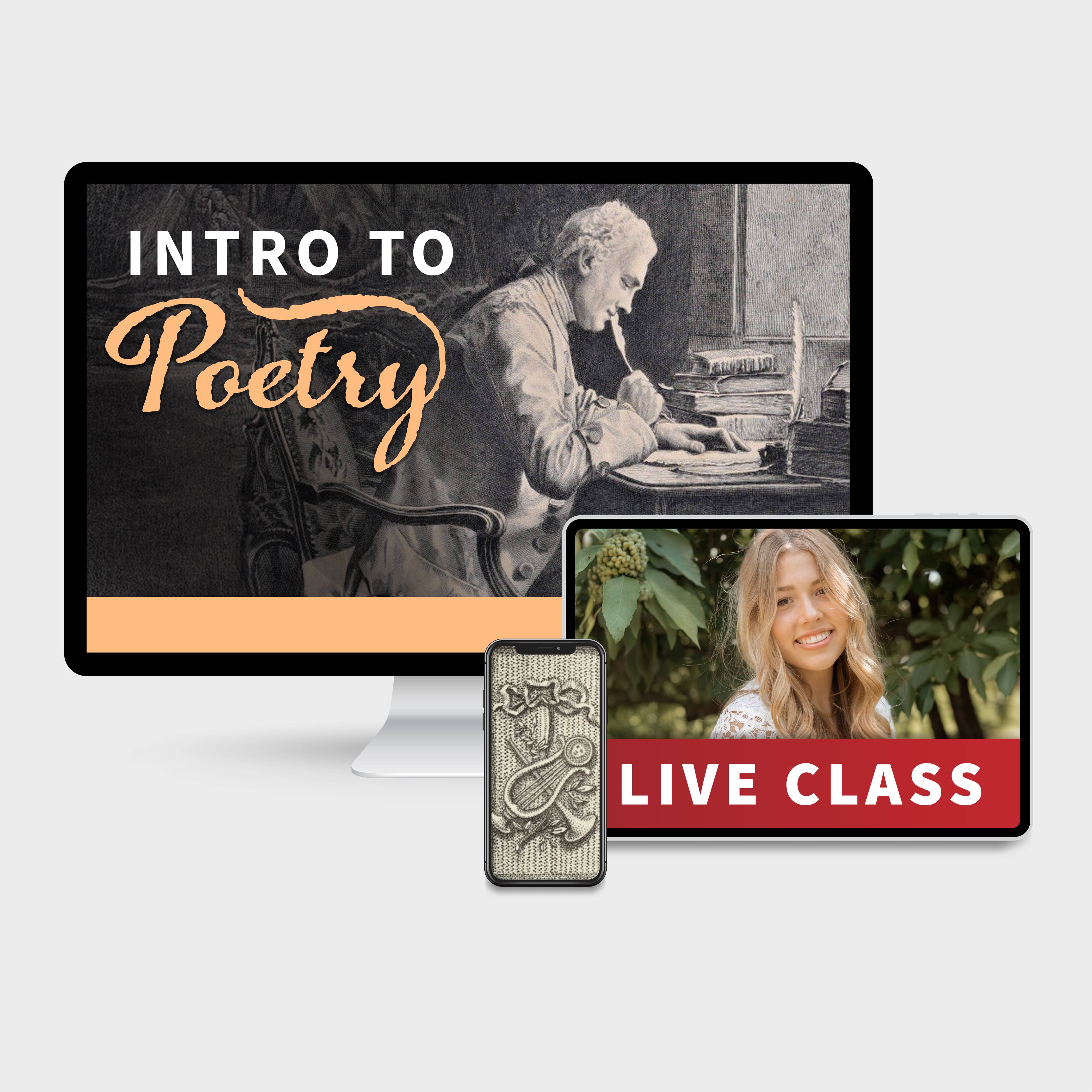Introduction to Poetry Live
- 14+
- 1/2 HS Credit

This product is licensed for individual student use only.
Request a group or school license.
Introduction to Poetry Live
- 14+
- 1/2 HS Credit
$325.00
Students will fall in love with poetry in this live, discussion-rich course that trains high school writers to read closely, hear rhythm and sound, and voice their insights with confidence. Guided by instructor Camille Floyd, they’ll explore poems weekly while developing the literary analysis skills needed for college-level English. Limited seats available.
Description
Introduction to Poetry is designed to help students explore the beauty of language through poetry—reading, listening, and writing about poems that capture ideas, emotions, and imagination. This course helps students appreciate poetry by giving them the tools to read verse, understand it, and ask the right questions about it. They’ll gain confidence in reading closely, recognizing literary devices, and expressing their ideas about history’s oldest form of literature.
Poetry can seem mysterious or intimidating to students, but this course demystifies the art form by teaching practical skills for reading and analysis. Students will explore poems from different time periods and styles, learning to appreciate both traditional and modern approaches to poetry. By the end of the course, students will have developed the confidence and skills needed for college-level English courses.
Upon completion of this course, students will be able to:
- Read poetry with attention to both sound and meaning
- Recognize and identify key poetic devices and techniques
- Analyze poetry using close reading and literary analysis skills
- Ask insightful questions about poetic texts
- Perform oral readings of poetry with understanding and expression
- Write analytically about poetry with clarity and insight
- Approach college English courses with confidence
What’s Included
- Weekly live instruction covering poetic forms, techniques, and devices
- Discussion-based classes with short lectures on poetry analysis
- Close reading practice with poems from various time periods and styles
- Oral reading opportunities to experience poetry’s sound and rhythm
- Written responses to develop analytical writing skills
- Final paper with instructor feedback
- Final grade submitted to parents for their records
Who This Class Is For
This course is perfect for students who:
- Want to develop confidence reading and analyzing poetry
- Are preparing for college English courses
- Find poetry confusing or intimidating and want practical tools for understanding
- Love language and want to explore its most concentrated artistic form
- Need to strengthen their close reading and literary analysis skills
Class Details
Credit: Half Credit in High School English/Language Arts
Recommended Grade Range: High School (9th-12th Grade)
The class will meet weekly over Zoom on Fridays from 12:30-1:30 PM Central Time for one semester. The format will be discussion-based with short lectures focused on poetic forms, techniques, and devices. Students will read and analyze a variety of poems from different time periods and styles, learning to appreciate both traditional and modern approaches to poetry.
About the Instructor
Camille Floyd holds a B.A. in English from Lipscomb University and recently completed postgraduate studies at the University of Oxford. With experience as a Teacher’s Assistant in Advanced Composition and a writing tutor, she is passionate about helping students grow in confidence and find their unique voice. Her study of literature across time periods gives her insight into poetry’s enduring power to move and inspire.
Required Materials
All course materials will be provided by the instructor, including:
- Selected poems from various time periods and styles
- Reading guides and analysis worksheets
- Examples of literary analysis writing
- Reference materials on poetic devices and forms
Students should have:
- Computer or laptop with reliable internet connection
- Word processing software (Microsoft Word, Google Docs, or similar)
- Notebook and writing materials for planning and note-taking
Course Units
Classes meet weekly on Fridays from 12:30-1:30 PM Central Time throughout the semester.
This semester-long course covers the following major units:
- What is Poetry? – Definition, purpose, rhythm, and imagery
- Sound & Sense – Rhyme, meter, alliteration, and assonance
- Traditional Forms – Sonnet, haiku, villanelle, ode, and elegy
- Modern & Free Verse – Contemporary approaches to poetic expression
- Writing about Poetry – Developing analytical writing skills and completing a final paper
Students will read and analyze poems throughout the semester, participate in class discussions, practice oral reading, complete written responses, and write a final analytical paper on poetry.
Schedule of Class Meetings
All Fridays, all scheduled from 12:30-1:30 PM Central Time.
- Jan 16 – Course Introduction, Syllabus & Learning Objectives
- Jan 23 – Poetry as Genre: Subcategories of Poetry, Definitions, & Brief History
- Jan 30 – First Questions: What to Ask & Not to Ask
- Feb 6 – Form, part 1
- Feb 13 – Form, part 2
- Feb 20 – Describing Content
- Feb 27 – Speech Act
- Mar 6 – Scansion
- Mar 13 – Rhyme
- Mar 20 – Inner Form
- Mar 27 – Spring Break
- Apr 3 – Perspective & Who’s Talking?
- Apr 10 – Paraphrase, Metaphor, and Imagery
- Apr 17 – Paper Conferences
- Apr 23 – Paper
- Apr 30 – Paper Due
Frequently Asked Questions
What if I can’t attend the live Zoom sessions?
All the sessions will be recorded and posted for enrolled students to watch at their convenience. You can use the recordings to review or catch up if you missed a session.
Students who can’t make the schedule above can still participate in the class assignments and group discussions by watching the recordings and communicating in the group on My Compass Classroom.
What kinds of assignments and assessments are included?
Assignments include reading and analyzing poems, class discussion participation, written responses, oral reading of selected poems, and a final paper on poetry. All are designed to help students develop close reading skills and appreciation for poetic language.
Will my student receive a final grade?
Yes! The instructor, Camille Floyd, will provide a suggested final grade based on submitted assignments, participation, and final paper. Since this is a live homeschool course, the parent has the final authority and may use this grade as part of their student’s official transcript or records.
Is there a minimum enrollment required?
All live classes are subject to minimum enrollment in order to hold. If minimum enrollment is not reached before the first scheduled session, all students will be notified and refunded completely.
Do you offer refunds on live classes?
We think you will love this class. If you don’t, you may request a refund but must do so no later than before the second scheduled class after your enrollment (purchase) date. This gives you the chance to experience an entire live class session to make your decision.
How long will I have access to the class?
Recording access expires 6 weeks after the last live session. Students are free to continue working through the course on their own during this time. However, no submissions will be graded after the final class meeting, or as directed by the instructor.
Additional information
| Age | 12+ (grades 7-11) |
|---|---|
| Age/Grade | |
| Credit | 1/2 HS |
| Credit Amount | |
| Lessons | 14 |
| Teacher | Camille Floyd |
| Meeting Day(s) | Friday |
| Meeting Time(s) | 12:30 – 1:30 PM CST |


